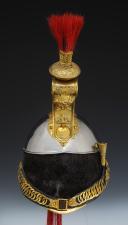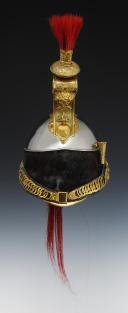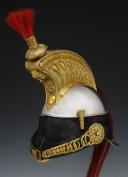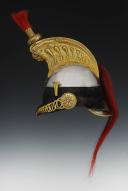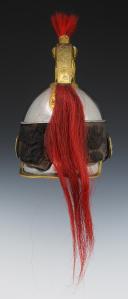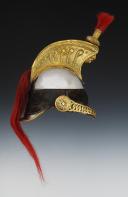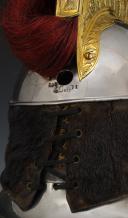
TRUMPET HELMET OF THE 4TH REGIMENT OF CUIRASSIERS, model 1858, Second Empire. 27041-1
Sold out
TRUMPET HELMET OF THE 4TH REGIMENT OF CUIRASSIERS, model 1858, Second Empire. 27041-1
Iron bomb stamped on the rear of the 4th Cuirassier Regiment “4 Cuir”, dated 1871 “717” and registered “203”. The gutter of the base of the bomb is of the 1858 model with a simple round rod. Strong leather turban covered with a navy cow headband. Visor lined with green waxed morocco and green waxed neck cover, both in iron and each bordered with a rush folded astride the outer border.
Stamped brass crest attached to the bomb by means of five round-headed brass screws, it is composed of a mask stamped with a flaming bomb surmounted by a Medusa head in relief with above a crown of branches of laurel and oak; two fins struck with a decreasing series of 8 gadroons framed with acanthus leaf and palmette beads and in the upper part with a series of laurel leaves; cover plate stamped with a decoration depicting a braided mane. Brass crest ornament composed of an olive decorated with palmettes, a socket with laurel branches and palmettes, and a scarlet horsehair puff. Brass plume holder decorated with laurel branches. Chinstraps model 1858; mounted on a leather chin strap covered with a series of rings ending in a rosette stamped with laurel leaves, fixed to the turban by means of a screw. Mane of scarlet horsehair, apparent length of approximately 43 cm. Inner cap in black waxed leather cut into ten wolf teeth with eyelets.
France.
Second Empire.
Very good condition, interior headdress worn with a missing wolf tooth.
HISTORY:
During the Franco-German War he was part of the 2nd reserve division commanded by General de Bonnemains, attached to the troops of Alsace commanded by Marshal de McMahon. It was on August 6, 1870 that the regiment had its hour of glory during the Battle of Froeschwiller. While the French army succumbed to its numbers and threatened to give in, McMahon decided to engage his cuirassiers to gain a few tens of minutes and better negotiate its disengagement. Heroic action, but without hope... The regiment lost 170 men killed, wounded or missing, almost a third of its strength. In the evening, there were barely more than 150 men in the ranks for the entire regiment.
Iron bomb stamped on the rear of the 4th Cuirassier Regiment “4 Cuir”, dated 1871 “717” and registered “203”. The gutter of the base of the bomb is of the 1858 model with a simple round rod. Strong leather turban covered with a navy cow headband. Visor lined with green waxed morocco and green waxed neck cover, both in iron and each bordered with a rush folded astride the outer border.
Stamped brass crest attached to the bomb by means of five round-headed brass screws, it is composed of a mask stamped with a flaming bomb surmounted by a Medusa head in relief with above a crown of branches of laurel and oak; two fins struck with a decreasing series of 8 gadroons framed with acanthus leaf and palmette beads and in the upper part with a series of laurel leaves; cover plate stamped with a decoration depicting a braided mane. Brass crest ornament composed of an olive decorated with palmettes, a socket with laurel branches and palmettes, and a scarlet horsehair puff. Brass plume holder decorated with laurel branches. Chinstraps model 1858; mounted on a leather chin strap covered with a series of rings ending in a rosette stamped with laurel leaves, fixed to the turban by means of a screw. Mane of scarlet horsehair, apparent length of approximately 43 cm. Inner cap in black waxed leather cut into ten wolf teeth with eyelets.
France.
Second Empire.
Very good condition, interior headdress worn with a missing wolf tooth.
HISTORY:
During the Franco-German War he was part of the 2nd reserve division commanded by General de Bonnemains, attached to the troops of Alsace commanded by Marshal de McMahon. It was on August 6, 1870 that the regiment had its hour of glory during the Battle of Froeschwiller. While the French army succumbed to its numbers and threatened to give in, McMahon decided to engage his cuirassiers to gain a few tens of minutes and better negotiate its disengagement. Heroic action, but without hope... The regiment lost 170 men killed, wounded or missing, almost a third of its strength. In the evening, there were barely more than 150 men in the ranks for the entire regiment.
Reference :
27041-1
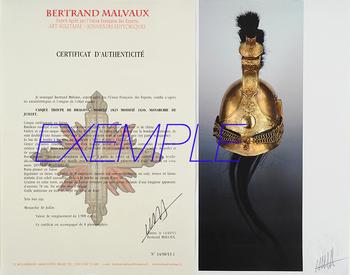
Next update Friday, april 4th at 1:30 PM
FOR ALL PURCHASES, PAYMENT IN MULTIPLE CHECKS POSSIBLE
bertrand.malvaux@wanadoo.fr 06 07 75 74 63
An authenticity certificate of the item including the description published on the site, the period, the sale price, accompanied by one or more color photographs is automatically provided for any item priced over 130 euros. Below this price, each certificate is charged 5 euros.
Only items sold by me are subject to an authenticity certificate, I do not provide any expert reports for items sold by third parties (colleagues or collectors).
